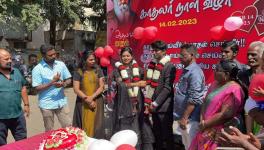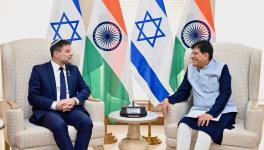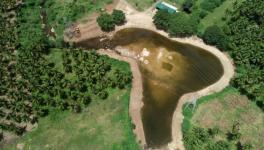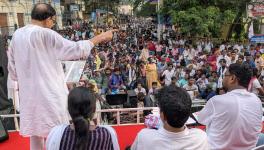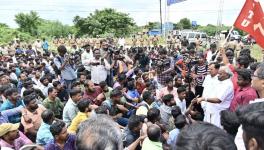A Day with Comrade Sankaraiah
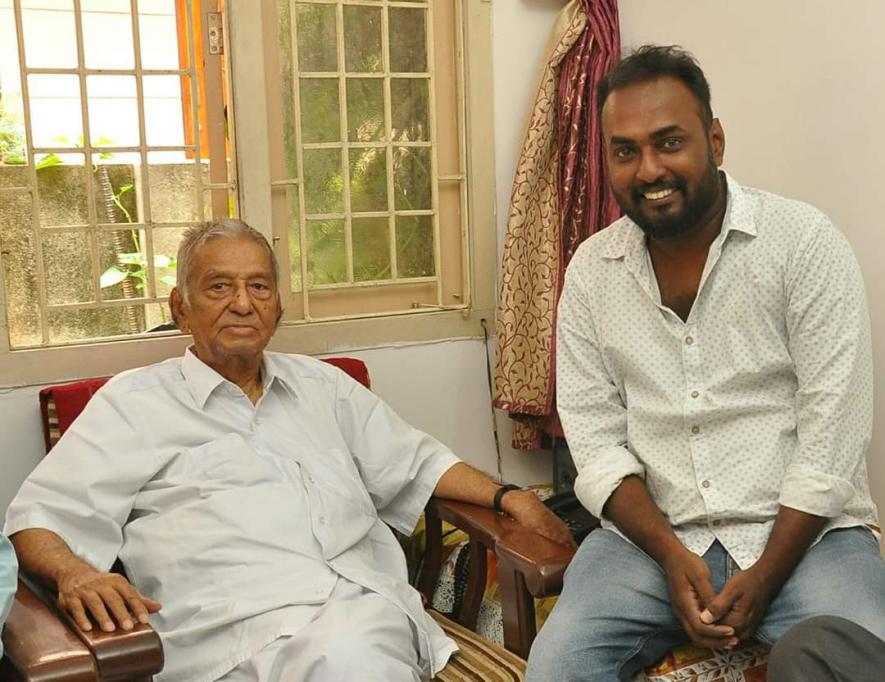
“Comrade NS (N Sankaraiah) has agreed to speak at Tamil Nadu Progressive Writers and Artists Association conference in Madurai. He had asked for you to accompany him? Can you?” The question from comrade Thamizhselvan filled me with both happiness and anxiety. “How could I even say no? I will certainly come,” I said.
Even as the party’s state committee comrades started making travel arrangements, I was bombarded with advice and suggestions from many well-meaning comrades. “Comrade is travelling by train after many years. Please be very careful. He could still walk on his own, but please hold his hand. He might use the bathroom often. Please take care,” I was told.
The day came. On February 26, 2018, at around 1.30 p.m. I walked into the party’s state committee office. “Comrade has been asking for you. Please meet him,” I was informed.
A tender physique, sparkling eyes and a voice that was shrill; though he did not have many teeth left. “Come,” he said, holding my hands. “I trust you to help me travel,” he said. I realised that my responsibility had increased manifold.
“Come by 5 p.m. with your luggage. Comrade Rajasekar will fill you with other details. He has the tickets,” comrade NS said.
I was at office at the appointed time. We had dinner by 7 p.m. After finishing his meal, comrade handed two of his bags to me. A slightly bigger and old bag had some clothes, his medicines and a toothpaste. The other was more like a shoulder bag, but I had no idea what it had.
Comrade walked towards the car. In ten minutes, we were at Egmore railway station, which was as busy as ever.
Comrade must have been to this station so many times. You could divide his life into two halves – one half in jail, the other on the rail. His personal history could be summed up in these words: He boarded trains and landed in jails.
However, for the last few years, he had not been to a railway station. The trains were perhaps angry, as we were greeted with an announcement that startled me. The Pandian Express, which generally leaves the station from the fourth platform will now be on the fifth. A walk of about 300 metres followed.
In a moment, comrade began asking, “How long should we go?” We were now near an escalator. “Comrade, you just have to take the first step,” I said. He was hesitant, yet stepped onto the escalator. I was worried and held him, but he was able to get off the escalator without much difficulty. Another walk followed. He walked slowly. “Has our coach come yet?”, he kept asking. Ours was a second-AC tier coach. Before he could get inside and seat himself, it was evident that comrade was finding it difficult. The train was yet to start. My mind began racing.
I was then a student of the government higher secondary school at Chrompet. ‘Comrade’ was a term that I had recently become acquainted with. There was something exciting about calling everyone a comrade, however old or young they were. Comrade (NS) would get down at Chrompet railway station and walk towards his home. It was like clockwork, around the same time when I would leave school for home. It was always exciting – almost celebratory – to call him comrade and extend a greeting.
When I first visited the house, he was seated in the centre on a chair. “Thatha (grandfather), isn’t Shyam around?” We referred to his second son Narasimman as Shyam. Back then, he was only thatha. His sons Chandrasekar and Narasimman were party leaders.
The first meeting to plan a students’ protest at our school happened at comrade’s house. About a hundred students gathered and met in front of the house. The protest was guided by comrades Bheema Rao and Shyam. Over the next few months and after many visits, thatha became comrade. Party supporters’ meetings also took place at comrade’s house. I started to hear stories about him.
My train of thought was interrupted by a phone call from comrade Thamizhselvan. I told him we were on the train. When comrade knew I was talking to Thamizhselvan, he asked to speak to him. “How is the conference work coming along? How is your wife? I will be there in the morning.” In a hushed voice, comrade Thamizhselvan told me that he would come to Madurai only by late in the afternoon. His wife was unwell. Comrade NS was wise to my expressions. “What happened?” he asked me. “Comrade Thamizh’s wife is unwell.” Now he was worried. “They live alone, he should take care of his wife. Tell him that if he calls again?”
Soon, a group of SFI comrades got on the train, greeted him and asked for his autograph. Comrade NS asked them about their life, education and how they would go back to home. As the students were leaving, he said: “Take care, study well. That is more important.”
My phone started ringing again. There were calls from S. Venkatesan, Santharam and other comrades who started enquiring about our travel.
As we prepared to sleep, comrade NS wore a sweater and a monkey cap. He looked handsome. “Okay, let us go to the bathroom.” By the time we stepped out of the AC coach, opened the door and reached the bathroom, comrade was visibly tired. “After we reach Madurai, we should think about whether we will return by train, okay?”,” he said, and was off to sleep.
I was reminded of what Saravanan told me. “Brother, please don’t sleep in the night. Comrade will feel bad about waking you up and will try to go to bathroom on his own.” From the upper berth, I kept a watch on the comrade – it looked like he was physically uncomfortable. At around 1 a.m., he called for me. “Shall we go to bathroom?”
The train was chugging, and comrade couldn’t negotiate his way properly. He was tired, again. At around 3.45 a.m. he called for me again. This time, softly. He perhaps did not want to disturb me in my sleep. “Comrade, we can go to bathroom,” I called back.
Before the train could stop at Madurai station, comrades from SFI were at the platform. When comrade alighted from the train, they raised slogans holding SFI flags aloft. Comrade was immediately excited. There was no trace of fatigue now. We left the station with comrades from the district committee. Soon, members of the public started asking about comrade. “Freedom fighter? Is he 96 years old? Has he come for a meeting? From Chennai? At this age?”
“Has the party vehicle come?” comrade asked. “Yes” said, Vijayarajan, the party’s district secretary. “Where are we staying?” “At Prem Nivas.” “How about members in Madurai? Are there youngsters in the party?” Comrades answered all his questions.
Comrade entered the room number 301 at the third floor of Hotel Prem Niwas. “Let me brush (my teeth) first,” he told me and went inside the bathroom. When I tried to accompany him, he resisted. “Not a problem, I can manage,” he said. “Ok, let the doors remain unlocked,” I said. He agreed. Soon, comrades from Madurai were in the room. After getting to know their names and of their villages, comrade NS would recount his experiences from those villages.
At this point, he briefly stopped to tell me that we will have to go back to Chennai by car. A few moments later, he started speaking of Stalin, a unit secretary. “His uncle had worked with me in Madurai. I am glad to see that families of my peers are also in the party.”
When I had asked him about breakfast, comrade rejected the idea of home-cooked food. “Why trouble our comrades? I will do fine with food from the restaurant,” he said. However, Stalin arranged for home-cooked food for him. Idlis, vadas and sambhar. Comrades kept coming in to enquire about him, and were stunned to learn to learn a bit of their own history.
It was as if you scratch the surface with comrade Sankariah, and a piece of history would find its way out.
When S. Venkatesan came, Sankariah held his hand and enquired about arrangements for the conference. In the course of the conversation, Venkatesan told him of the threats he had received from the right-wing and that he had petitioned the DGP at Chennai about it. Comrade NS demanded to see the copy of the petition and decided it will be the first part of his speech. “It is natural that we speak about it; Su Ve needs protection,” he told me, while preparing himself for the meeting.
A comrade now came in wearing a red towel and carrying a red bag. Comrade was excited to see him. The visitor held his hands, and was visibly moved – he was crying. Before I could make out what was happening, comrade told me that his name was A.K. Palani, a 92-year-old comrade. “I came all the way to see comrade NS,” he told me.
The next few minutes was about how he stood witness to party’s growth in Madurai. He spoke of the training centre which started work 60 years ago, and which was functional to the day. He spoke of his own contribution in keeping youngsters from the area in check by working with them – especially in keeping them away from alcohol and smoking. He showed a photo album of his 90th birthday celebration – held by the party’s Madurai unit in commemoration of his work for the party. Both comrades advised each other on keeping well.
After lunch, comrade told me: “We shouldn’t lose sight of what we are here for. Let me take some rest.”
By 3 p.m. comrade was ready for the meeting. From the small bag that he had carried from Chennai, he took out a sheet of paper and kept reading it over and over again.
“Is Thamizhselvan here? He said his wife was unwell. What is her status?” he asked me. I told him that Thamizhselvan was not picking up his phone. Later, Venkatesan told me that Thamizhselvan would not come to the meeting.
Comrade NS was scheduled to speak at 7.30 p.m. Comrades had planned on sending a vehicle accordingly. Comrade started pacing inside the hotel. I was not sure if it was anxiety or if he was preparing to speak. At least three times he sat inside the room and looked at the sheet of paper that he was carrying.
At 7 p.m. comrade wore a shawl and asked if we could leave. When we reached the venue, comrades surrounded him and raised slogans welcoming him near the stage. He went on and greeted the comrades. He started to speak. Now there was heat in the air. From a Hindu priest who said he would hurl soda bottles, to all the BJP leaders who were against freedom of expression, comrade spared none. He spoke of the communists’ contribution to Tamil Nadu and exhorted the youth to fall in love and get married to annihilate caste.
Who else but him would know of the significance of love? Wasn’t his marriage to Navamani beyond caste and religious considerations? Once I asked amma: “Where did you meet comrade? How did you fall in love?” In her response, she could only speak of his political life, of the party’s history. From her stories, I loved him more. I admired him more. Before he would get down from the party vehicle and get into house, he would call out for Navamani. Since I first met them, I had only seen them together. A few years ago, comrade was left alone. His wife lay there. I saw him look over her. I saw his body trembling. I saw him crying. But he learned to accept it.
He was still speaking to the crowds – beyond the time set for him. Why wouldn’t he? It was on this soil that he took part in the freedom struggle, on which he was removed from college. He continued to speak to massive response from the crowd.
It was difficult for him to climb down from the stage. There were huge crowds waiting to meet him. Soon, comrades made way for him and seated him in the vehicle. Amid greetings and slogans, and a sea of red flags, comrade’s vehicle started to move.
After dinner at a comrade’s house, many came to take pictures with him. He patiently enquired about every comrade, and when someone said he was from Pothumbu, comrade was moved. He recalled the grandfathers’ of each comrade and enquired about them. He asked to be photographed with comrades of Pothumbu. He spoke of how their families continue to work with the party.
We were now back to our room, and alone. “I spoke for over thirty minutes. I had covered all the points, but there is one left though. But I know it would take time,” he told me. Comrade’s face was glowing, in the happiness that he had done his duty. After a deep sleep he woke up at 5:45 a.m. He was also happy about he way The Hindu had covered his speech. “Good reporting, they stressed on the point of giving protection to Venkatesan,” he said.
He walked a bit, did a few light exercises and read the newspapers.
At 9 a.m. we were ready to leave. On our way, he pointed out places which had thriving Jain and Buddhist cultures, and spoke of the history of their downfall. The phone rang. Venkatesan asked if comrade would like to halt at a school in Tiruchy. Comrade refused. “Let us take a break at the party office in Villupuram,” he said.
When Thamizhselvan called, comrade enquired about his wife. “Don’t worry about not being present at the meeting, it is important that you are with your wife,” he told him.
At Villupuram bypass, a vehicle was waiting to guide ours to the party office. “I had inaugurated the party office at Villupuram. There was a good crowd. I had told them to construct a room on the upper floor. We should check if they had,” he said.
At the party office, comrade Ramamurthy asked if he would like to stay at his house. “You might find it difficult to walk the stairs to the party office.” But comrade NS rejected the idea. “I can walk, I will go to the party office.” In moments, he was in a room at the party office. Soon, he started enquiring about the Villupuram unit and related issues. Reeling out many names, he asked if their children continued to work for party.
“Pondy Veerabadhran and Govindan were instrumental in building the party in Pondicherry,” he explained. After regaling the comrades at Villupuram with his experiences, he said he was ready to go. Saravanan, who was driving the car took out his purse and showed us a photograph – a 20-year-old picture where he is seen with comrade NS. “I remember this well,” comrade said. “It was at Pazhanganatham – a public meeting.” Then he continued to speak to Saravanan about the meeting.
We were now nearing Tambaram. “Tell my son that we would be home soon,” he told me. Soon, he was at home, sitting in the same place where I had first met him. We soon left.
I felt lighter. Thamizhselvan called me and asked if comrade has been dropped. “Good, your mission is accomplished,” he responded, gleefully.
Today, comrade turns 99. How many leaders in the country remain who could still travel for the rights of people whose freedom they fought for?
Comrade shines as a guiding light. He will continue to be one.
Get the latest reports & analysis with people's perspective on Protests, movements & deep analytical videos, discussions of the current affairs in your Telegram app. Subscribe to NewsClick's Telegram channel & get Real-Time updates on stories, as they get published on our website.











